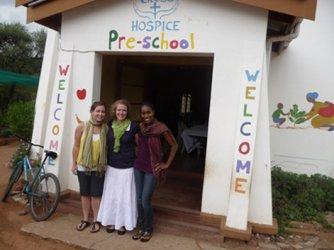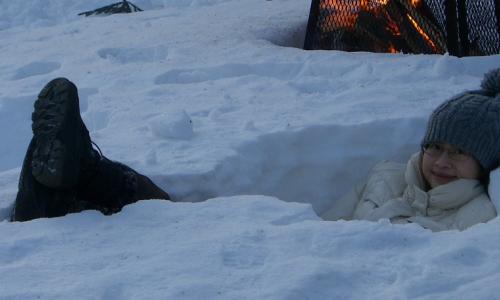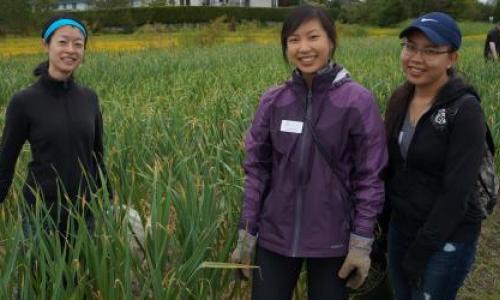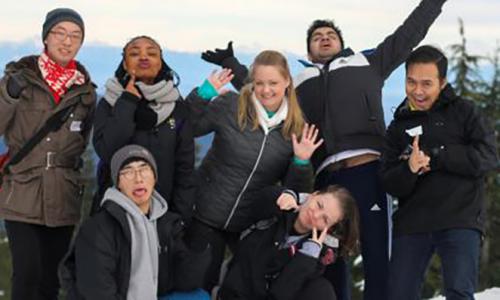
Jessica Kehler (above, middle) spent many moments dreaming of the hills and plains of Africa while sitting in her room in residence at SFU studying for her Kinesiology courses. The country that captured Jessica's attention in the end was that of landlocked Botswana. Jessica sat down with the OLC to discuss what it was like to work in a country known for its diamond mining and tourism.
Did you always want to go internationally for Co-op?
Going on an international Co-op work term was always something I wanted so I decided it was time. I'm a 5th year student in Kinesiology and was looking for something related to my field of study but also wanted a unique opportunity to try something a little different. I found a posting on Symplicity for Students Without Borders which had positions in both Peru and Botswana, but I chose Botswana as Africa is alluring to me and I had heard much about the continent.
Students Without Borders is a program run by a larger umbrella organization called World University Service of Canada (WUSC). Their main project is to organize volunteering overseas to help populations of countries strongly affected by HIV and AIDS. They offered a Social Worker Assistant position at Holy Cross Hospice in Botswana, so I applied. The job description included care and interaction with patients that was closely related to occupational therapy work. I was short listed for a phone interview by the WUSC head office in Ottawa and it went very well. They recommended me for the job and sent my résumé plus their interview notes to the hospice Director to make the final decision. Once I was accepted, I went to Ottawa for a two day orientation with other WUSC students with similar jobs going abroad and then flew to Botswana the first week of September.

Was your family supportive of you going on an international Co-op work term?
My parents supported me entirely. They have always encouraged me and my siblings to travel and they knew Africa was my dream destination for as long as I can remember.
What type of work did you do in Botswana?
The Holy Cross Hospice is a non-profit organization that uses a holistic approach to treating terminal HIV/AIDS patients. Once in Botswana, after spending a week at the Hospice, I met with the Director and we agreed that I would be a good fit to take over for the physiotherapist that had just finished her work term there. I began designing and leading basic exercise and stretching routines for the patients to help them become more mobile. I organized and participated in activities with the patients, interacted in conversation with them and attended outings and workshops with them. I also helped the other staff with odd jobs on the computer, organized workshops for caregivers and facilitated activities for the pre-school kids. A typical week was 9 hour days, 5 days a week.
What kind of cultural differences did you discover?
While living in Gaborone (Botswana's capital) for 4 months, I tried to immerse myself in the culture as much as possible, which included trying new foods. I was actually surprised at how much 'westernized' food they had there but I still had a chance to experience the local eats. They eat a lot of beef, which I enjoyed, but they also eat the cow intestine which wasn't quite as tasty. Their meals are much heavier than what I was used to because every meal included lots of meat and pounded maize (a type of corn).
Another culture difference I experienced was how warm and friendly people are there. Strangers will approach you and start chatting, invite you to their church or a friend's wedding or a braai (BBQ). I always felt welcome, even as a foreigner.
Do you plan on returning to Botswana?
I am returning. I made some amazing friends over there and fell in love with the country so I am planning to return to Botswana and Zambia this summer and hopefully find work during my stay.
Your Co-op work was on a volunteer basis. How did you support yourself?
This is an incredible experience but unfortunately it is not a cheap one. WUSC provided a bursary to cover a portion of the flight but I also had to pay their program fee. The flight is fairly expensive considering you are flying into the southern region of Africa. I was able to live on about $2000 for the 4 months in terms of expenses (this included basic living expenses such as food, rent, etc.) I know it is a little pricey but it is definitely worth it. WUSC provides you with an orientation once you get into the country and helps set up accommodations.
I also received the International Co-op award which you can apply to for any international Co-op position. This also greatly helped subsidize the costs of living abroad for my Co-op work term. There are a variety of ways to counter balance the cost of completing an international Co-op work term if it is volunteering; it just requires students getting out there to discover what is financially available to them. Many students I know fundraised for specific parts of their trip.
What tips can you provide to students considering pursuing an international Co-op work term?
You have to be very open to changes and accepting of different cultures so you can enjoy it instead of fearing the differences you encounter. Adaptability is a huge asset as, at times, you often don't end up doing what your initial job description detailed. Be confident in your skills to do the job that is asked of you, whatever that may be. There are many transferable skills that you bring with you from each course, job or life experience that will come in handy and many of these skills you may not have considered using before.
What tips can you provide to students who are preparing to leave Canada to begin their international Co-op work term?
Get excited! Even if you are worried about missing home, the time flies by and you will enjoy it. Pack minimally! Don't get carried away with bringing stuff. You will need less than you think and you can usually buy the things you forgot or miss in the location where you are placed.














